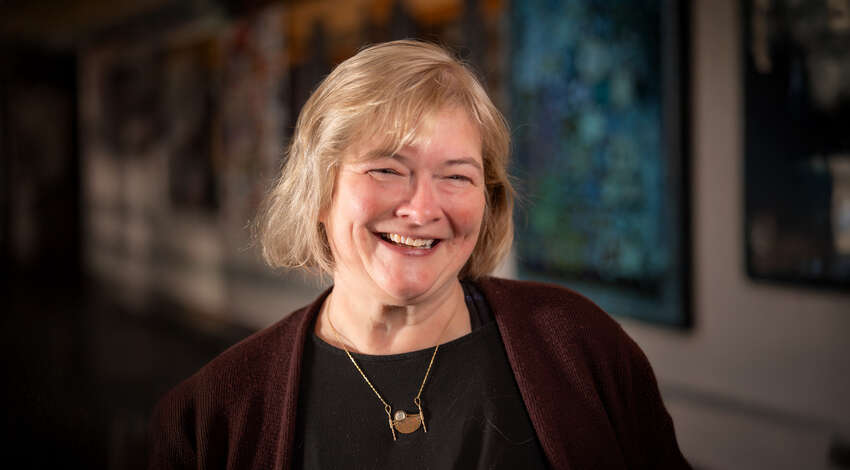Relocating in Retirement: An Age Well conversation with Catherine Frank, Ph.D.
Catherine Frank, Ph.D., is the executive director of the Osher Lifelong Learning Institute (OLLI) at the University of North Carolina at Asheville. One of the most popular offerings among the Institute’s programs for older adults is the Creative Retirement Exploration Weekend, which looks at the issues and opportunities surrounding relocating in retirement. We spoke to Dr. Frank recently about things to consider when contemplating whether to move or stay put.

Dr. Catherine Frank
How did OLLI get involved in helping people with retirement planning?
Until 2013, OLLI was the North Carolina Center for Creative Retirement. Then, as now, its focus was on lifelong learning generally, and in addition to programs on traditional educational topics, there were also some on civic engagement and leadership. During that period, there was an article in Parade magazine about the Center and how it was empowering older adults to be active in the community.
The feature generated thousands of letters! Some were asking about setting up similar programs in other communities, but others were inquiring about how to move to Asheville. So, OLLI began a program outlining what it would be like to move to Asheville in retirement. Over the years, it's really evolved to helping people think through the issues of moving and relocating in retirement anywhere.
There are so many ways to come at the subject. Where do you recommend people start?
It’s natural for people to feel a bit at a loss trying to wrap their head around retiring. For so much of our lives — our working lives or our parenting lives or our married lives — we know kind of what the world expects of us. And then suddenly, retirement is upon us and we have to rethink everything, right down to where we’re going to live.
We recommend that before you start thinking about your address, you take stock of your “wish list” for retirement generally. What will constitute a meaningful retirement for you? Think about it in terms of relationships, physical activity, learning opportunities, all of those sorts of things that might make up a different life in retirement if you want it. These can help guide you to a specific place, or type of place.

You mentioned physical activity. That’s certainly something a lot of people look forward to in retirement, whether it’s golf, or hiking or racquet sports, so how big a part of the equation should that be in picking a retirement spot?
It’s certainly reasonable to make our favorite activities a top priority, but we also need to keep in mind the inevitability of change. As we get older, we hit certain plateaus. None of us are the same as we were 30 years ago, and if we’re fortunate to be retired for an equally long time, we’ll change some more. It’s a bit of a cliché, but we often refer to the “go-go,” the “slow-go” and the “no-go” years in retirement. A lot of people when they first retire are going to do all the things that have been on their list. They’re going to take up all the hobbies they’ve ever wanted to explore, try the side business, go everywhere and do everything. But often they reach a point where they get overloaded with that sort of thing. They change their minds, change their pace and slow down a little bit. So, it’s important to recognize that the place that’s great for you right now, the place with all the brewpubs and the hiking and so on, may not be as important or appealing to you in 10 or 15 years.
When we’re thinking about where to retire, we need to think beyond the short term. And that’s not just true of physical activity.
What are some other considerations that warrant looking further down the road?
Family is top of mind for a lot of people approaching retirement. For parents, there’s often a desire to move closer to children who have “left the nest” — and to grandchildren, of course! But children grow up more quickly than we remember, and the ideal of being a grandparent and cuddling and reading doesn't last all that long before the kids are off pursuing their lives, their interests, their games, their school, all of those kinds of things. So, it’s important to recognize that your vision of being a grandparent will likely be very temporary. And of course, given the mobility of today’s workforce, there’s no guarantee that after you get there, your children won’t pull up stakes and move to follow a new job.
All of which is not to say we shouldn’t think about moving to be closer to our families! But it does mean we are wise to consider whether a particular location would be suitable even without the draw of family. And I think it’s also important, for the same reasons mentioned, not to invest too much in the notion that our children will be available to us as caregivers.

That raises the issue of health care. It’s very much on the minds of people looking to relocate, isn’t it?
Yes, and with good reason. We all will probably face some sort of health crisis as we age, and that’s a source of anxiety for people considering a move. How will I find a doctor? Is access to medical care easy in the place I’m considering, and is the quality level good? What type of assisted-living facilities might be available should that become necessary? There are also factors to consider with regard to health policy in various states. The laws differ about continuing care, for instance. Medicare payments and benefits vary to some extent by state, as well. Mobility services and other local resources for older people can vary greatly. Suffice it to say that doing your homework about health care and realistically assessing your needs are very important parts of planning where to live.
Let’s go back to the idea that the things you want to be engaged in change the deeper you go into retirement.
It’s true that they do, but you know the old saying, “When one door closes, another opens.” In our programs, we talk to our members and hear how they surprise themselves by making friendships at this time of life, how they surprise themselves by taking on new interests and hobbies, how they surprise themselves by adopting a plant-based diet! How they surprise themselves by hiking for the first time ever. So, it’s things big and small that lead to a fulfilling life in retirement, and having the flexibility to embrace them as they come — and leave other things behind — is important. Last year at one of our programs, someone said to make your plans for retirement in pencil, because things change. Some you can predict, others you can’t.
You mentioned friendships, and that’s something most people are concerned about. Relocating means leaving good friends behind — but also making new ones.
These days, we’re all worried about how we connect in a world that sometimes seems really impersonal. We hear more and more about the impact of isolation on our health, and of course that’s been a real issue since the beginning of the COVID-19 pandemic. Our sense of disconnection is also exacerbated to an extent by the political climate nowadays.
So, I would say forming new friendships will be important — but they aren’t something you just fall into, the way it sometimes happens in books and movies. You have to be intentional about cultivating them. Where you decide to live factors in as well, because friendships are much harder to develop if you’re living in a relatively remote or sparsely populated area. There just aren’t the kinds of community-based opportunities to connect, especially for older adults.
Among the places people often think of retiring are college communities, because in many instances, those offer sort of small-town connection in size with bigger-city amenities. Usually in these communities, you have sporting events, theater, lectures, concerts — those sorts of things are always in the air in college towns. There are a lot of things intentionally bringing people together there. And it’s possible that they can be lower-cost places to live, as well. College town or not, if making new friends will be important to you, look for the type of place that facilitates connection through its community life, and in particular its offerings for older adults.

Can you talk further about the issue of cost, and housing in particular?
There’s a lot of discussion right now about the volatility of housing. I think that the cost of housing has risen dramatically everywhere. I mean, there are really very few inexpensive places to live. I guess you can go really rural where places are probably less expensive, but they may also be further from health care — and also lacking in the kinds of opportunities for connection that we were just talking about.
You know, a lot of people who've lived in urban places will sell their homes, and they can move to places where housing is expensive by local standards, but it’s a bargain for them. For many, many other people, though, the cost of housing is going to be a limiting factor. In addition, there can be a lot of competition for housing suitable for older people. In Asheville, for instance, the single-story ranch house is almost a white whale.
There are other options — continuing-care retirement communities, for example. But they're typically quite expensive, and out of the reach of a lot of people.
But the news is not all bad! I believe it's part of a national trend that there are more creative options for older adults. Apartment living is more common. I think probably this generation has had the mindset of, “I'm not going to throw my money away on rent. I'm going to buy my own place,” but sometimes renting is a much better option. If you allow a cushion for future rent increases on a fixed income, you can find that apartment living is a more affordable, relatively stress-free way to go. And it may help you locate in an appealing place that would otherwise be unaffordable.
Historically, retirees have been drawn south for lower housing costs coupled with a warmer climate. But how are people’s feelings on climate evolving?
So, we had been talking for a long time about the kind of impacts that climate might have on where people choose to retire. You know, so many of the retiree destinations are resort-style places. Now those are looking a lot less attractive because of the hurricanes in Florida and the extreme heat in Arizona, and those kind of events. What’s more, the destruction wrought by some of the storms is starting to affect other places where they were once rare, Asheville being an unfortunate example. The most obvious things to be concerned about in this respect are personal safety and the health of the community, but there are trickle-down effects like the enormous increase in insurance premiums we’ve been seeing in hard- and often-hit areas like Florida. That in turn is impacting property values. So what we’re hearing is a lot more internal debate among our members about whether to set their sights on these traditional destinations or look elsewhere. It’s another area where there are lots of trade-offs to consider.

Okay, let’s say you’ve decided on a place to move. You’re going to downsize. But now you’ve got a house full of stuff to get rid of!
This is a big one! We’ve had decluttering experts in to speak to our members. And they basically tell you to go through your stuff and make piles of what you want to keep, what you want to give away, and what you want to donate — recognizing that your kids might be a good target of giveaways. That said, one thing I hear so frequently is, your kids don't want your china. They don't want your china cabinet. They don't want your formal silverware, and of course that's a blow to people who collected those things and loved them.
I think it's not easy for anybody. We've gone through this with my daughter for years, you know, what to throw away, what she wants us to keep. But you can't be too sentimental about things. I know from personal experience! I had all my notes from graduate school. At one point I realized I was never going to use them again, never going to look at them again. So, I said, “Well, you did good work!,” and then I put them in the recycling, and then they were gone. I think sometimes you just have to be ruthless about it.
You’ve provided a lot to think about. If people take one thing away from all this, what should it be?
I know this conversation has focused a lot on potential pitfalls and things to be anxious about. But the real takeaway is that you can relocate happily in retirement! It just takes research and planning and forethought. You know, most people spend more time planning a big trip than they do planning their retirement, and that isn’t a recipe for success.
For a lot of people, leaving the place they’ve known in their working lives is very liberating. They put themselves in a new place, they see things differently, and they thrive in their new lives. That’s what I wish for all of them, and thoughtful planning is the way to get there!
